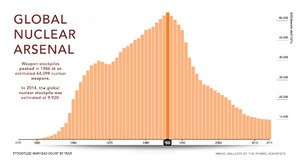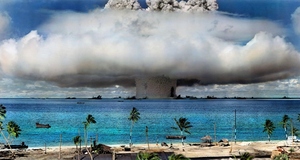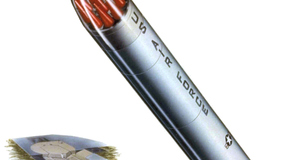From Cornell International Affairs Review VOL. 4 NO. 2The New Geopolitics: Why Nuclear Weapons No Longer Serve U.S. InterestsRichard Burt is the former U.S. ambassador to Germany, and recently played a critical leadership role in the ratification of the Strategic Arms Reduction Treaty (START). Burt had previously served as a correspondent for the New York Times, and is a current managing director of McLarty Associates. The following essay is a transcription of his lecture at Cornell University, given on December 2nd. One of the big issues in Washington right now is whether or not this lame duck Senate is going to ratify the new START (Strategic Arms Reduction Treaty). I want to start by making a proposition or offering hypothesis about nuclear weapons. In my view, they are very much 20th century weapons. We often forget that the technology really goes back to the famous Manhattan project during the course of World War II. But they are 20th century weapons, geopolitically in my view, in part because they are seen as weapons of deterrence. In the minds of many historians and politicians, when they think of WWII, they think about the failure of deterrence — the whole Munich analogy: the fact that France, Britain, and other European countries failed to deter Nazi Germany, and that nuclear weapons going forward from WWII were seen as instruments that threatened unacceptable damage, thus deterring any new manifestation of Adolf Hitler or Nazi Germany. Of course these were the weapons of the Cold War, another 20th Century phenomenon. They were in some ways a principle instrument of waging the Cold War, by both the U.S. and the Soviet Union. Nuclear weapons were seen as a means of controlling and moderating a grand ideological and global competition between the two superpowers. Threatening unacceptable damage was viewed as a rational means of dampening a conflict, which could be triggered by an isolated incident — say an incident in divided Berlin during the Cold War, which could then escalate to a superpower nuclear exchange. Thus, the U.S.Soviet nuclear competition during the Cold War — what came to be known as the "Arms Race" — became a way of measuring and sometimes testing commitment and courage in not letting the other side gain the upper hand. There would be no nuclear eunuchs. Both sides were determined to demonstrate that deterrence would work, and not allow the other side to achieve global political and military domination. Thus, memories of appeasement were a critical factor for both sides, and more broadly, so were the lingering memories of WWII during the Cold War more broadly. Now I talk about the Cold War because I personally was very much part of that process. After graduating from Cornell, I attended the Fletcher school, where I discovered my passion, which was studying the dynamic of the U.S.Soviet nuclear competition. From there, I went to the New York Times, where I was the recipient, not of WikiLeaks, but of many other leaks that described the new developments of nuclear weapons in the Soviet Union, and the response of the United States. Then, I went onto the State Department, where I was put in charge of one of the most complicated and challenging tasks of U.S. diplomacy during that era. I had the job of rallying NATO support, or our European allies' support for the deployment of 572 nuclear-armed missiles, based in Europe, but targeted against the Soviet Union. This was a very different era. There were huge protests in Europe against the deployment of these so called "Euro Missiles," and there were also Soviet threats. The Soviet Union, in an effort to dissuade the alliance from deploying these missiles, threatened a new "Ice Age" in East-West relations. The bottom line was, in the fall of 1983 we — i.e. the Reagan administration and its European Allies — prevailed. We deployed the missiles, a move viewed as one of the important turning points in the Cold War. At the same time, already in the 1980s, things were beginning to change. On the U.S. side, I remember very clearly that both Ronald Reagan and George H.W. Bush were both looking for a way out of what they thought, or what appeared to be, an endless arms competition with the Soviet Union. And perhaps more importantly, there were changes on the Soviet side too. Mikhail Gorbachev came to power, and I think he rapidly reached two critical conclusions in the mid to late 1980s. First, the Soviet Union did not have the economic wherewithal to keep pace with the United States in this nuclear arms competition. It was just too expensive, and too technologically demanding. Secondly though, Gorbachev also understood that both the Soviet Union, and the broader Soviet empire — the Warsaw Pact, the eastern European countries under Soviet military, political, and economic domination — required reform. I now remember a meeting that my boss, George Schultz, convened in the mid 1980s on the 7th floor of the State Department. It was a Saturday morning. He brought a lot of the U.S. Government experts on the Soviet Union togetherwhat to informally discuss Gorbachev and was what wasi going on in the Soviet Union. The one thing I remember very clearly was a young, talented C.I.A. Russian analyst named Bob Gates, the current Secretary of Defense. After hearing many people argue that Gorbachev represented something "new," and that he was a reformer, and was ready to change the Soviet Union, Gates said, "Mr. Secretary," looking at George Shultz, "Mikhail Gorbachev is Leonid Brezhnev in a nine hundred dollar suit." Well, Bob Gates was wrong, at least about Gorbachev, and you know the end of the story. The Soviet Union collapsed because Gorbachev, despite his best efforts, revealed the contradictions of reforming a highly authoritarian system. Once you begin to try to reform it, it begins to unravel. Thus, since the early 1990s, what we have seen with the end of the Cold War, the end of the Soviet Union, is a slow but steady transition to a new and different international system. This system is more open, more polycentric; it has more points of power, and is one, in my view, that is less based on geopolitics, or perhaps better put, less based on military politics and more based on geo-economics. Strangely, the United States, and to some extent the new Russian Federation, have had the most difficulty since the early 1990s in making this transition to a new international order. To understand this, you need to better understand the nature of this new international system. For great powers, for the major power in the United States, Russia, mature European democracies, emerging markets like China, India, and Brazil, this new system is in some respects, a return to the 19th century. It is a kind of balance of our world where we have shifting alliances rather than permanent alliances. We have a flexible focus on short term calculations of national interest, but unlike the 19th century, the currency of power has changed, and this is what's critical for understanding the new role of nuclear weapons. The currency of power has changed from military power to economic, technological competitiveness. Thus, this is where we see perceptive analysts like Tom Friedman, who understands and haves explained to us that for the foreseeable future, the key elements of national power will be economics, technology, and education. For the first time in over half a century, the United States will be competing on a more level playing field. Unlike the 19th and 20th centuries, wars of acquisition, of territorial enlargement, will look less unattractive to major powers, and will look increasingly risky. Instead, countries will be able to achieve their objectives without territorial acquisition, because in a globalized world economy, trade and investment can do the job. Look at Japan and Germany. In the 1930s Germany unleashed a war in Europe based on the desire for lebensraum, the idea of living space, of needing more space to grow and prosper. Germany of course was decisively defeated; the lebensraum dream disappeared. But, look at Germany today. Germany accounts for one third of the European G.D.P., and their businesses have penetrated every market in the European Union. They've even gone beyond the European Union, and are Russia's number one trade and investment partner. In today's world, it releases its very productive and very capable industries. They have succeeded, if you will, in their 1930s dream, but through a geo-economic strategy, not a military one. Schematic showing nations with nuclear weapons programs. Nations shown in dark grey are part of the NPT. Japan is also a case and point. In WWII, Japan wanted to create a "greater Asian coprosperity sphere," and in fact they pretty much did that in the 1960s and '70s. The Japanese may have problems with their economy today, but it has nothing to do with the fact that their impressive economic growth during the postwar period underscored the new currency of power in International Relations. Thus, the bipolar world that we were familiar with during the Cold War, and the short period where at least some people in Washington, especially the neo-cons, talked about a uni-polar world with only the United States. The bi-polar and uni-polar states have passed away. What we have now is a cluster of mature economies and big emerging markets, like the B.R.I.C.s, that will secure their interests, chiefly through innovation, trade, and investment in the years ahead. Now, does this mean that nuclear weapons and nuclear deterrence will entirely lose their relevance? Not completely. If the United States were to shift its strategy overnight, drop the idea of nuclear deterrence, and unilaterally disarm its nuclear arsenal, such a move would be highly destabilizing. It would be misunderstood by our political adversaries, who would view it as an inexplicable act of unilateral disarmament. It would unsettle our allies, who have come to depend on U.S. military power, to some degree, for deterrence. But, I do believe that among the new cluster of great powers, that nuclear weapons and deterrence will over the next decade or so become increasingly irrelevant. We are entering a period when patterns of both international cooperation and conflict will shift quickly, depending on the issue, depending on the national interest of the country involved, and where threatening unacceptable damage with nuclear weapons will no longer seem like a rational foreign policy decision. For example, under what circumstances today would the United States threaten to use nuclear weapons against Russia? I can't really think of a plausible scenario where we would launch hundreds or thousands of nuclear weapons against Russia. And why, for example, would China threaten the United States with nuclear weapons, particularly knowing that they're not going to get any of the money back that they've lent us if they destroy us as a functioning society? In the great power world of the future, nuclear weapons and nuclear deterrence become less relevant and less important. I guess at this point in the lecture I could just stop and say ‘Welcome to the brave new world, isn't it wonderful?' Unfortunately, I can't, because the other side of this G-20 world, the other side of this major power world —, which is focused on economic competition, innovation, trade and investment as ways for countries to make their mark and protect their interests —; there is another world;, a darker world of rogue states, like north Korea and Iran; of failing states, potentially like Pakistan, and sub-state actors, some of them entirely irrational, i.e. al-Qaeda, the Taliban, and others. And here, unfortunately, as nuclear weapons become less relevant for the G-20 world, nuclear weapons are becoming more important, rather than less important. For one thing, the technology is just much more available than it was before. Remember, this technology is now over 50 or 60 years old. You can find plans on the Internet, and if you can obtain either the plutonium or the enriched uranium, then you can build one. It may not be as efficient or as capable as those deployed in the U.S. stockpile, but it can kill several million people if you detonate it in downtown Manhattan. That know-how and that material are becoming much more available. More importantly, the desire to obtain this capability on the part of rogue states, failing states, sub-state actors, terrorists and others, is equally as strong. Let me give you a couple of examples. I agree with the vice president Joe Biden, who has been quoted in saying, "Pakistan is the most dangerous country on this planet." Think about it. It's a three-for. They have a government that is arguably failing. It can't deal with the normal stresses and strains of government, let alone the pressures it's under from insurgent attacks, natural disasters, anda governance divided between incompetent civilian leadership and a very powerful military leadership — iIn short, failing governance. Number two, they are hosting — whether they know it or not — a group like al-Qaeda in the northwest provinces, and the Pakistani Taliban is increasingly active throughout the country. They are increasingly becoming a platform for terrorism both within Pakistan and externally. Finally, they not only have a stockpile of nuclear weapons, but of all the existing nuclear powers, they are building them faster, and manufacturing more weapons grade material than any other country in the world. Pretty scary. Not too far from Pakistan of course, is Iran. I'm not sure whether the Iranians (this is a controversial thing to say in Washington) have yet decided to acquire nuclear weapons. In fact they may not actually, if they do build a "weaponized" nuclear weapon — one that can be deployed on a missile or delivered by an aircraft. They may not even tell anybody. They may want to keep people guessing about whether or not they've gone nuclear. For me, the danger of an Iranian nuclear weapon is not that they are going to immediately, once they acquire it, nuke Israel or Saudi Arabia. In the great power world of the future, nuclear weapons and nuclear deterrence become less relevant and less important. In the case of Israel, the Iranians are rational enough to know exactly what the Israeli response would be. The danger is what some people call the cascade effect. I mentioned the Wikileaks articles just a few minutes ago. One thing that is very clear, despite what Arab leadership in the gulf says about Iran, is that in private they are very worried about Iran, and they are very concerned about Iranian domination of the gulf. If the Iranians go nuclear, you have got to believe that other countries in that neighborhood that will start to think about nuclear weapons. I was just in Turkey three weeks ago, sitting around with Turkish government officials, and I asked them what Turkey will do if Iran acquires a nuclear weapon.Continued on Next Page » Suggested Reading from Inquiries Journal
Inquiries Journal provides undergraduate and graduate students around the world a platform for the wide dissemination of academic work over a range of core disciplines. Representing the work of students from hundreds of institutions around the globe, Inquiries Journal's large database of academic articles is completely free. Learn more | Blog | Submit Latest in International Affairs |




















